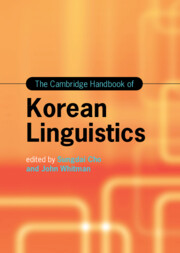Book contents
- The Cambridge Handbook of Korean Linguistics
- Cambridge Handbooks in Language and Linguistics
- The Cambridge Handbook of Korean Linguistics
- Copyright page
- Contents
- Figures
- Tables
- Contributors
- Preface
- Acknowledgments
- Abbreviations
- Part I Korean Overview
- Part II Phonetics and Phonology
- Part III Morphology and Syntax
- Chapter 12 Right-Dislocation in Korean: An Overview
- Chapter 13 Experimental Insights on the Grammar of Korean Anaphors
- Chapter 14 Person-Denoting Nominals: Interpretations and Structures
- Chapter 15 Lexical Nominalizations in Korean
- Chapter 16 The Processing of a Long-Distance Dependency in Korean: An Overview
- Part IV Semantics and Pragmatics
- Part V Sociolinguistics and Psycholinguistics
- Part VI Language Pedagogy
- Index
- References
Chapter 14 - Person-Denoting Nominals: Interpretations and Structures
from Part III - Morphology and Syntax
Published online by Cambridge University Press: 30 September 2022
- The Cambridge Handbook of Korean Linguistics
- Cambridge Handbooks in Language and Linguistics
- The Cambridge Handbook of Korean Linguistics
- Copyright page
- Contents
- Figures
- Tables
- Contributors
- Preface
- Acknowledgments
- Abbreviations
- Part I Korean Overview
- Part II Phonetics and Phonology
- Part III Morphology and Syntax
- Chapter 12 Right-Dislocation in Korean: An Overview
- Chapter 13 Experimental Insights on the Grammar of Korean Anaphors
- Chapter 14 Person-Denoting Nominals: Interpretations and Structures
- Chapter 15 Lexical Nominalizations in Korean
- Chapter 16 The Processing of a Long-Distance Dependency in Korean: An Overview
- Part IV Semantics and Pragmatics
- Part V Sociolinguistics and Psycholinguistics
- Part VI Language Pedagogy
- Index
- References
Summary
Chapter 14 examines several sets of person-denoting nominals that show interesting patterns in terms of how they participate in compounding and how they take arguments and modifiers in the syntax. Using a few key exemplar nominals such as ‘writer’, ‘author’, and ‘passenger’, the chapter argues that the different structures in which the nominals appear relate to whether the denotation of a given use of the nominal is fundamentally dispositional, relating to a long-term property, or fundamentally episodic, relating to a particular event or situation. It illustrates several morphological and syntactic differences which it then accounts for in terms of these semantic properties. The last part of the chapter examines NP-internal syntax and develops an account for structures involving modifiers which are marked with genitive case, and those which lack genitive marking.
- Type
- Chapter
- Information
- The Cambridge Handbook of Korean Linguistics , pp. 394 - 428Publisher: Cambridge University PressPrint publication year: 2022

